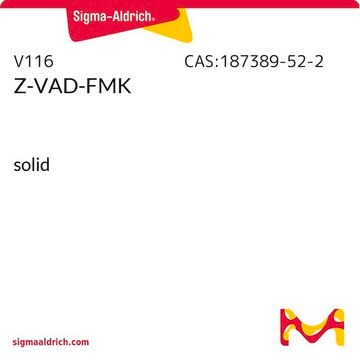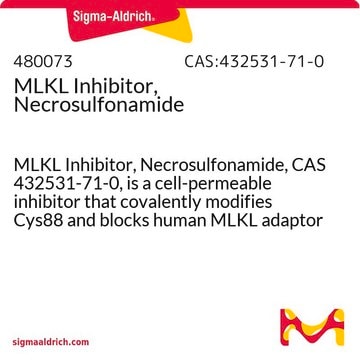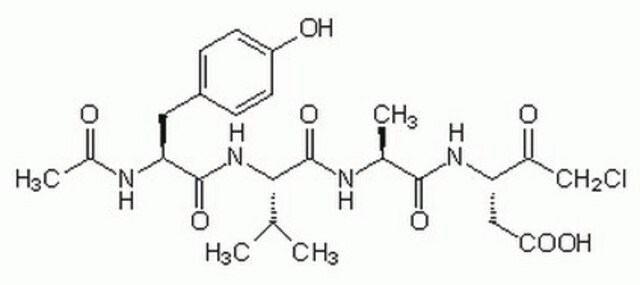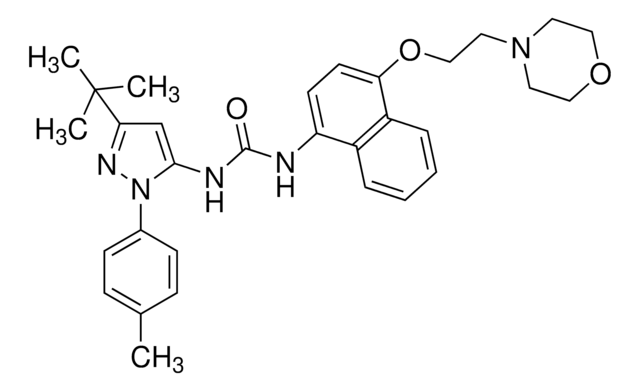480065
Necrostatin-1
≥95% (HPLC), crystalline solid, necroptosis inhibitor, Calbiochem
Sinónimos:
Necrostatin-1, Nec-1, Necrosome Inhibitor I, 5-(Indol-3-ylmethyl)-(2-thio-3-methyl)hydantoin, Necrosis Inhibitor II, Methyl-thiohydantoin-tryptophan, MTH-Trp, Receptor-Interacting Protein 1 Inhibitor I, RIPK 1 Inhibitor I, Nec1, RIP1 Inhibitor I
About This Item
Productos recomendados
product name
Necrostatin-1, Necrostatin-1, CAS 4311-88-0, is a cell-permeable, potent, and selective blocker of necroptosis (EC₅₀ = 494 nM in FADD-deficient Jurkat cells treated with TNF-α).
Quality Level
assay
≥95% (HPLC)
form
crystalline solid
manufacturer/tradename
Calbiochem®
storage condition
OK to freeze
protect from light
color
yellow
solubility
DMSO: 10 mg/mL
methanol: 5 mg/mL
shipped in
ambient
storage temp.
2-8°C
InChI
1S/C13H13N3OS/c1-16-12(17)11(15-13(16)18)6-8-7-14-10-5-3-2-4-9(8)10/h2-5,7,11,14H,6H2,1H3,(H,15,18)
InChI key
TXUWMXQFNYDOEZ-UHFFFAOYSA-N
General description
Biochem/physiol Actions
Blocker of necroptosis
Packaging
Warning
Reconstitution
Other Notes
Degterev, A., et al. 2012. Cell Death Differ.20, 366.
Christofferson, D.E., et al. 2012. Cell Death Dis.3, e320.
Takahashi, N., et al. 2012. Cell Death Dis.3, e437.
Degterev, A., et al. 2008. Nat. Chem. Biol.4, 313.
Degterev, A., et al. 2005. Nat. Chem. Biol.1, 112.
Muller, A.J., et al. 2005. Nat. Med.11, 312.
Teng, X., et al. 2005. Bioorg. Med. Chem. Lett.15, 5039.
Legal Information
Storage Class
11 - Combustible Solids
wgk_germany
WGK 3
flash_point_f
Not applicable
flash_point_c
Not applicable
Certificados de análisis (COA)
Busque Certificados de análisis (COA) introduciendo el número de lote del producto. Los números de lote se encuentran en la etiqueta del producto después de las palabras «Lot» o «Batch»
¿Ya tiene este producto?
Encuentre la documentación para los productos que ha comprado recientemente en la Biblioteca de documentos.
Los clientes también vieron
Nuestro equipo de científicos tiene experiencia en todas las áreas de investigación: Ciencias de la vida, Ciencia de los materiales, Síntesis química, Cromatografía, Analítica y muchas otras.
Póngase en contacto con el Servicio técnico













